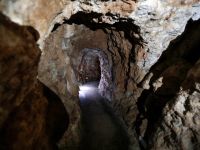George Habash, one of the most charismatic actors on the Middle East scene, announced Wednesday that he is to step down from the leadership of the radical Popular Front for the Liberation of Palestine (PFLP).
At the age of 75, Habash, a fierce opponent of the policy of compromise of Palestinian leader Yasser Arafat, appears ready to give up the fight now that his deputy, Abu Ali Mustapha, has gone to live in the autonomous Palestinian territories, where he moved last September after 32 years in exile.
Habash, whose PFLP is one of the three main factions in the Palestine Liberation Organisation (PLO), along with Arafat's Fatah, and the Democratic Front for the Liberation of Palestine (DFLP) of Nayef Hawatmeh, strongly opposed Arafat's 1993 Oslo peace deal with Israel.
But as the peace process has advanced, he has toned down his opposition.
The PFLP and Fatah held a series of meetings in the summer of 1999, first in Cairo, and later in Amman. Habash has concentrated his calls on a revitalization of the PLO, and on the right of return for the roughly 3.5 million Palestinians living in exile.
He let it be known back in November that he intended to step down from the leadership of the PFLP, which he has headed since its establishment in 1967, in order to devote himself to writing his memoirs, setting up a research center, and working to create an Arab national front against normalization of relations with Israel.
But in announcing his impending retirement from the party leadership Wednesday, he made it clear that his political activities would continue.
"There is a fundamental difference between quitting the post of secretary-general of the PFLP and giving up politics," he told journalists.
His departure is expected to be announced at a general congress of the party starting Thursday in Damascus.
Habash was born on August 2 1926, in the Palestinian town of Lod, the son of a Greek Orthodox merchant family.
His life was turned upside-down one day in July 1948, when at the age of 22 he found himself caught up in a tide of thousands pouring down a dusty road as they fled the Israeli occupation troops advance on his hometown.
"It is a sight I shall never forget," he said many years later.
"Thousands of human beings expelled from their homes, running, crying, shouting in terror. After seeing such a thing, you cannot but become a revolutionary."
He graduated from the American University of Beirut in 1951 as a pediatrician, and the next year he founded the Arab Nationalist Movement (ANM), which aimed at unifying the whole Arab world to confront Israel.
At the same time he worked in a "people's dispensary" in Amman until 1957 when he was forced to go underground as a result of his political activity, and moved to Damascus where he stayed from 1958 to 1963, before going on to Beirut.
He founded the PFLP, preaching "popular armed resistance," in December 1967, six months after the "Six Day War", which saw Israel occupy large swaths of Arab territory including east Jerusalem, the West Bank and the Gaza Strip.
The movement came to international attention with a series of spectacular hijackings in 1970, which Habash justified not only as legitimate action against Israel, but as bringing publicity to the Palestinian cause, which had long been ignored.
Habash's radicalism, and his denunciation of Arab regimes, put a price on his head, and not only in Israel. He was wanted in Jordan and at one time even imprisoned in Syria, although he managed to escape.
The PFLP formed the hard core of the Rejection Front which attempted for many years to crystallize opposition to any moves towards compromise with Israel.
Married, and the father of two daughters, Habash has lived in Damascus since 1982, when the Israeli invasion drove all Palestinian factions from Beirut where he had established his headquarters.
But he refuses to set foot in the Palestinian territories so long as the Palestinians of the Diaspora are not allowed to go there – (AFP)
© 2000 Al Bawaba (www.albawaba.com)







